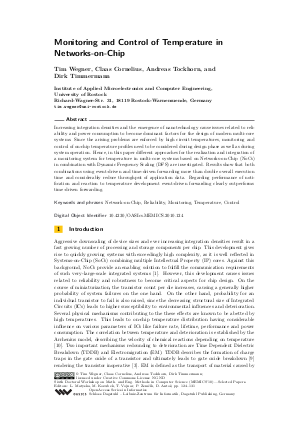Monitoring and Control of Temperature in Networks-on-Chip
Authors Tim Wegner, Claas Cornelius, Andreas Tockhorn, Dirk Timmermann
-
Part of:
Volume:
Sixth Doctoral Workshop on Mathematical and Engineering Methods in Computer Science (MEMICS'10) -- Selected Papers (MEMICS 2010)
Part of: Series: Open Access Series in Informatics (OASIcs) - License:
 Creative Commons Attribution-NonCommercial-NoDerivs 3.0 Unported license
Creative Commons Attribution-NonCommercial-NoDerivs 3.0 Unported license
- Publication Date: 2011-03-11
File

PDF
OASIcs.MEMICS.2010.124.pdf
- Filesize: 471 kB
- 8 pages
Document Identifiers
Subject Classification
Keywords
- Network-on-Chip
- Reliability
- Monitoring
- Temperature
- Control
Metrics
- Access Statistics
-
Total Accesses (updated on a weekly basis)
0Document
0Metadata
Abstract
Increasing integration densities and the emergence of nanotechnology cause issues related to reliability and power consumption to become dominant factors for the design of modern multi-core systems. Since the arising problems are enforced by high circuit temperatures, monitoring and control of on-chip temperature profiles need to be considered during design phase as well as during system operation. Hence, in this paper different approaches for the realization and integration of a monitoring system for temperature in multi-core systems based on Networks-on-Chip (NoCs) in combination with Dynamic Frequency Scaling (DFS) are investigated. Results show that both combinations using event-driven and time-driven forwarding more than double overall execution time and considerably reduce throughput of application data. Regarding performance of notification and reaction to temperature development event-driven forwarding clearly outperforms time-driven forwarding.
Cite As Get BibTex
Tim Wegner, Claas Cornelius, Andreas Tockhorn, and Dirk Timmermann. Monitoring and Control of Temperature in Networks-on-Chip. In Sixth Doctoral Workshop on Mathematical and Engineering Methods in Computer Science (MEMICS'10) -- Selected Papers. Open Access Series in Informatics (OASIcs), Volume 16, pp. 124-131, Schloss Dagstuhl – Leibniz-Zentrum für Informatik (2011)
https://doi.org/10.4230/OASIcs.MEMICS.2010.124
BibTex
@InProceedings{wegner_et_al:OASIcs.MEMICS.2010.124,
author = {Wegner, Tim and Cornelius, Claas and Tockhorn, Andreas and Timmermann, Dirk},
title = {{Monitoring and Control of Temperature in Networks-on-Chip}},
booktitle = {Sixth Doctoral Workshop on Mathematical and Engineering Methods in Computer Science (MEMICS'10) -- Selected Papers},
pages = {124--131},
series = {Open Access Series in Informatics (OASIcs)},
ISBN = {978-3-939897-22-4},
ISSN = {2190-6807},
year = {2011},
volume = {16},
editor = {Matyska, Ludek and Kozubek, Michal and Vojnar, Tomas and Zemcik, Pavel and Antos, David},
publisher = {Schloss Dagstuhl -- Leibniz-Zentrum f{\"u}r Informatik},
address = {Dagstuhl, Germany},
URL = {https://drops.dagstuhl.de/entities/document/10.4230/OASIcs.MEMICS.2010.124},
URN = {urn:nbn:de:0030-drops-30735},
doi = {10.4230/OASIcs.MEMICS.2010.124},
annote = {Keywords: Network-on-Chip, Reliability, Monitoring, Temperature, Control}
}
